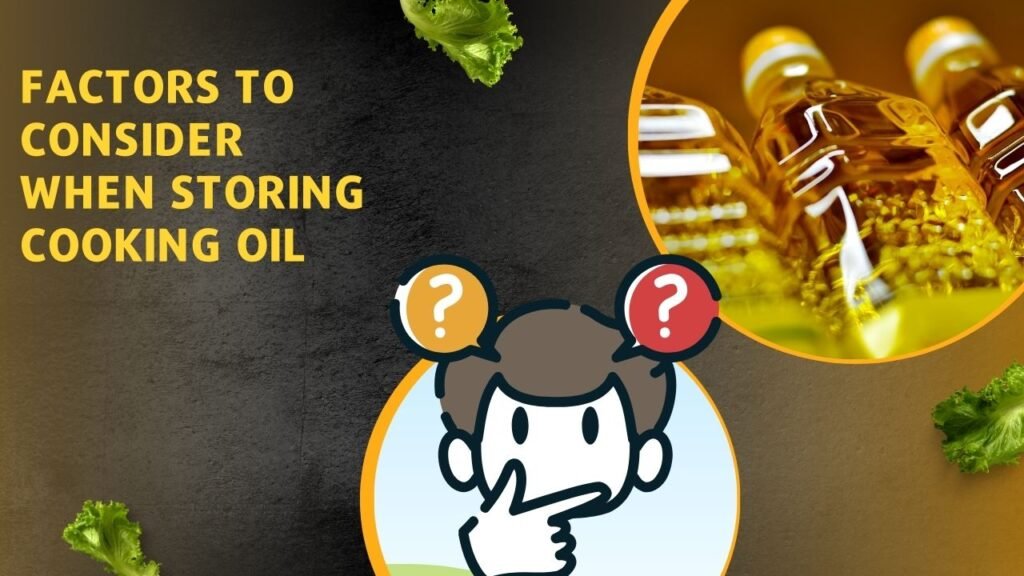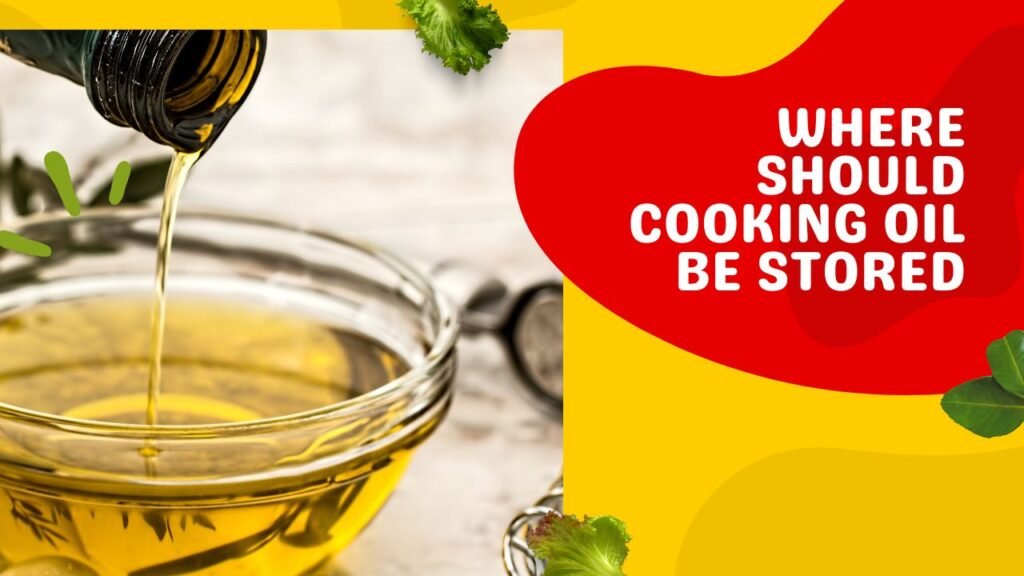Ever found yourself reaching for a bottle of cooking oil, only to discover it’s gone rancid? It’s a kitchen nightmare many of us have faced. Where should cooking oil be stored to maintain its freshness and flavor? Let’s dive into the best practices for storing your liquid gold, ensuring your culinary creations always turn out delicious.
Why Proper Storage of Cooking Oil Matters
Cooking oil isn’t just a pantry staple; it plays a crucial role in the taste and texture of your dishes. Proper storage can extend the shelf life, prevent spoilage, and maintain the oil’s nutritional value. But with so many options available, where should cooking oil be stored to achieve all this?
The Science Behind Cooking Oil Storage
Understanding the factors that affect cooking oil’s longevity can help you make informed decisions:
- Light Exposure: Light can accelerate the oxidation process, leading to rancidity.
- Temperature Fluctuations: Extreme temperatures can break down the oil’s molecular structure.
- Air Exposure: Oxygen can cause the oil to oxidize and spoil faster.
By controlling these elements, you can keep your cooking oil fresh for longer.
Best Places to Store Cooking Oil
So, where should cooking oil be stored in your kitchen? Let’s explore the top options:
1. Pantry or Cupboard
Storing cooking oil in a cool, dark pantry or cupboard is one of the most common and effective methods.
Pros:
- Keeps oil away from direct light.
- Maintains a consistent temperature.
Cons:
- Prone to heat from nearby appliances.
- Possible exposure to air if not sealed properly.
2. Refrigerator
Refrigerating cooking oil can significantly extend its shelf life, especially for oils like flaxseed or walnut oil.
Pros:
- Slows down oxidation.
- Preserves delicate oils’ flavors.
Cons:
- Some oils may become cloudy or solidify (this is normal and reversible by bringing them to room temperature).
- Requires space in the fridge.
3. Kitchen Cabinet with UV-Protective Doors
If you have a cabinet with UV-protective doors, it can be an excellent place for storing cooking oil.
Pros:
- Shields oil from harmful light.
- Often maintains a stable temperature.
Cons:
- Not all cabinets have UV protection.
- Limited space depending on cabinet size.
4. Pantry with a Dark Interior
A pantry specifically designed with a dark interior can also be a great storage spot.
Pros:
- Minimizes light exposure.
- Often designed for long-term storage.
Cons:
- Accessibility might be an issue.
- Requires a dedicated space.

Factors to Consider When Storing Cooking Oil
Choosing the right storage location involves more than just picking a spot. Here are key factors to keep in mind:
Temperature Control
Maintaining a consistent, cool temperature is crucial. Avoid areas near the stove, oven, or dishwasher where heat is prevalent.
Light Exposure
Light accelerates the oxidation process. Store oils in dark containers or opaque bottles to minimize light exposure.

Air Tightness
Always ensure the bottle is tightly sealed to reduce oxygen exposure, which can lead to rancidity.
Container Material
Opt for containers made of dark glass or stainless steel. These materials protect against light and are non-reactive, preserving the oil’s quality.
Table: Comparison of Cooking Oil Storage Options
| Storage Option | Temperature Stability | Light Protection | Air Exposure | Best For |
|---|---|---|---|---|
| Pantry or Cupboard | High | Moderate | High | Common cooking oils (e.g., olive, canola) |
| Refrigerator | Very High | High | Low | Delicate oils (e.g., flaxseed, walnut) |
| UV-Protective Kitchen Cabinet | High | Very High | Moderate | Premium oils (e.g., extra virgin olive) |
| Dark Interior Pantry | High | High | High | Long-term storage of various oils |
Tips to Extend the Freshness of Cooking Oil
Want to keep your cooking oil fresh for as long as possible? Here are some practical tips:
1. Use Dark Bottles
Dark glass or opaque bottles block out light, protecting the oil from oxidation.
2. Keep It Sealed
Always tighten the cap after use to minimize air exposure.
3. Avoid Temperature Swings
Store oil in a place where the temperature remains relatively stable to prevent degradation.
4. Purchase Smaller Quantities
Buy oil in smaller containers to reduce the time it’s exposed to air and light once opened.
5. Label with Purchase Date
Keep track of when you bought the oil to use it within its optimal timeframe.
Common Mistakes to Avoid
Even with the best storage plans, it’s easy to make mistakes. Here are some to watch out for:
1. Storing Near Heat Sources
Avoid storing oil near the stove, oven, or other heat-emitting appliances. Heat speeds up the spoilage process.
2. Leaving the Bottle Open
Always keep the bottle closed tightly. An open bottle exposes the oil to air, leading to faster rancidity.
3. Using Transparent Containers
Clear bottles let in light, which can degrade the oil’s quality over time.
4. Ignoring Expiry Dates
Be mindful of the oil’s shelf life. Using oil past its prime can negatively affect your dishes.
How to Tell If Cooking Oil Has Gone Bad
Ever wondered how to make sure your cooking oil is still good? Here are some signs:
Smell
Rancid oil has a distinct, unpleasant odor. If it smells off or stale, it’s time to toss it.
Taste
Spoiled oil will have a bitter or sour taste. A small taste test can confirm if it’s still good.
Appearance
Check for any changes in color or consistency. Cloudiness or separation can indicate spoilage.
Texture
Some oils may become sticky or overly thick when they’ve gone bad.
Shelf Life of Common Cooking Oils
| Cooking Oil | Shelf Life (Unopened) | Shelf Life (Opened) | Best Storage Method |
|---|---|---|---|
| Olive Oil | 18-24 months | 6 months | Pantry in dark bottle |
| Canola Oil | 12 months | 6 months | Pantry or cupboard |
| Coconut Oil | 2 years | 1 year | Pantry or refrigerator |
| Flaxseed Oil | 6 months | 3 months | Refrigerator |
| Peanut Oil | 1 year | 6 months | Pantry or cupboard |
| Sesame Oil | 1 year | 6 months | Pantry or cupboard |
FAQs About Cooking Oil Storage
1. Can I store cooking oil in the freezer?
While technically possible, freezing cooking oil can alter its texture and make it difficult to use. It’s generally better to store oils in a cool, dark place or the refrigerator.
2. Does storing cooking oil in the refrigerator affect its taste?
Most oils will maintain their taste if they’re allowed to return to room temperature before use. However, some delicate oils might experience slight changes in flavor.
3. How can I tell if my cooking oil is still good?
Check for any off smells, unusual tastes, changes in color or consistency, and stickiness. If in doubt, it’s safer to discard the oil.
4. What’s the best container for storing cooking oil?
Dark glass or stainless steel containers are ideal as they protect the oil from light and are non-reactive.
5. Can I reuse cooking oil?
Yes, but it should be strained and stored properly after each use. Reused oil has a shorter shelf life and may affect the flavor of your dishes.
Final Thoughts
Where should cooking oil be stored? The answer depends on the type of oil and your kitchen setup. Whether you choose the pantry, refrigerator, or a specialized cabinet, the key is to keep it away from light, heat, and air. By following these storage tips, you can ensure your cooking oil stays fresh, flavorful, and ready to elevate your meals.
Remember, a little care goes a long way in the kitchen. So, next time you reach for that bottle of olive oil, you’ll know exactly where to store it for maximum freshness. Happy cooking!


